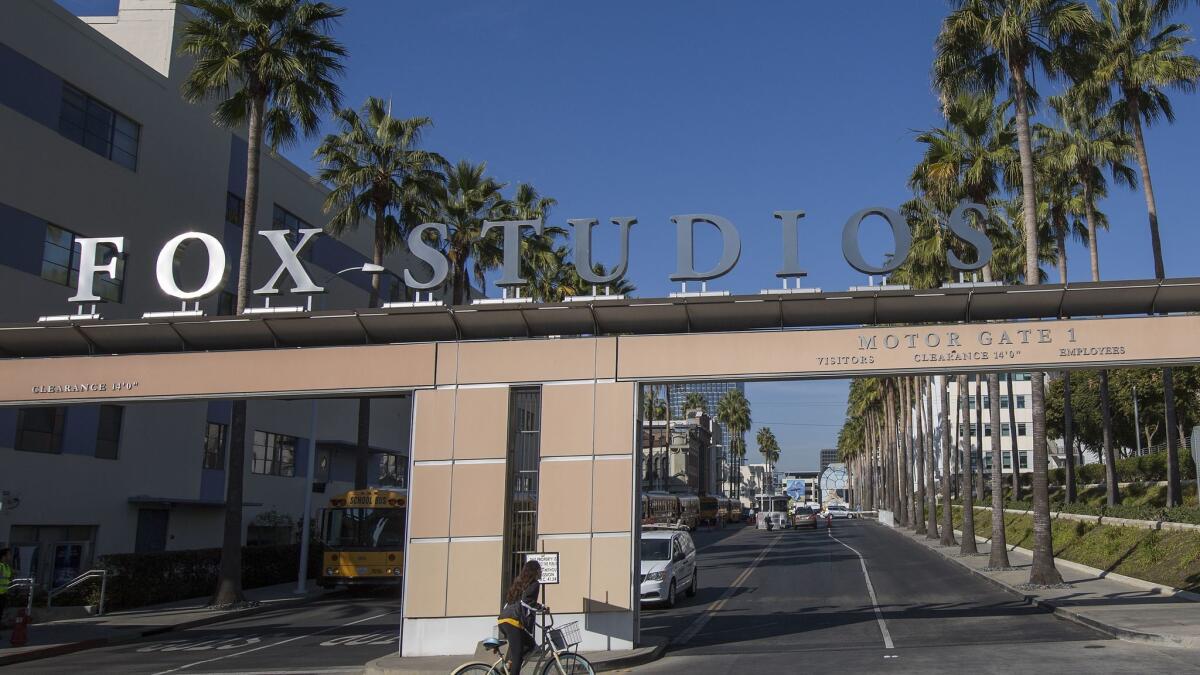With Fox purchase, Disney takes on tech titans in streaming wars

- Share via
Disney CEO Bob Iger’s audacious bid to buy much of the media empire Rupert Murdoch built represents a big bet that the Burbank company can beat Silicon Valley in the war for the future of entertainment.
The Walt Disney Co. on Thursday agreed to pay $52.4-billion to buy film and TV assets owned by 21st Century Fox, the largest acquisition in the company’s history. The deal would not only transform Hollywood into a land of fewer studio giants, but fire a clear warning shot to technology juggernauts like Netflix, Amazon and Google.
The message: Legacy media — or at least Disney, the king of them all — isn’t going down without a fight.
With the new deal, Iger is marshaling resources that will position the company to turbocharge its digital ambitions as audiences for traditional television have been shrinking and movie attendance has stagnated. Viewers are inundated with options, including big-budget shows available through Netflix and Amazon.
After weeks of speculation, Disney on Thursday confirmed it will purchase assets including the 20th Century Fox movie and television studio and cable networks, plus international TV holdings and Fox’s interest in digital channel Hulu. Murdoch would retain control of Fox News Channel and the Fox broadcast network, which would be spun off into a separate company.
Disney would also assume about $14 billion in debt, resulting in a total deal value of about $66 billion. Following the transaction, Fox shareholders would make up about 25% of the bulked-up Disney.
The proposed purchase of much of Murdoch’s 21st Century Fox eliminates one of the six major Hollywood studios and accelerates the trend of media consolidation in the industry.
The pending combination isn’t just about putting Fox’s Marvel franchises such as The Fantastic Four and X-Men on the same corporate team as Iron Man and Captain America. Nor is it all about putting James Cameron’s “Avatar” and “Star Wars” under the same roof to sell more movie tickets, theme park passes, toys and video games.
While those are obvious advantages in the normal studio world, the overall deal is about bulking up Disney’s digital streaming services that can compete against Netflix, and whatever the other digital behemoths are planning to do in the space. The entertainment powerhouse also needs more content to bolster its television business, which has struggled.
The Fox franchises would add to Disney’s already formidable stable of entertainment brands, including Marvel superhero movies, Lucasfilm’s “Star Wars” saga, and a powerful animation business, all of which combined could be a formidable draw for streaming customers.
“It allows them [Disney] to take on the beast that is Netflix and to come at them full on,” said Eric Schiffer, CEO of The Patriarch Organization, a Santa Ana-based private equity firm. “This is a major war and Netflix has the upper hand but Disney has the goods: the content.”
Disney is building two streaming services — one for films and TV shows set for 2019, and an ESPN-branded offering for sports in 2018. Having a controlling stake in Hulu, which has 47 million viewers, gives Disney another place to put content for online audiences, including the edgier Fox fare that would be out of place on a more family-friendly Disney-branded service.
“This acquisition reflects a changing media landscape, increasingly defined by transformative technology and evolving consumer expectations,” Iger said in a Thursday call with analysts. “Today’s empowered consumers want more — more compelling high-quality entertainment, more access to content, more choice and more convenience.”
Investors cheered the deal. Disney shares rose $2.96, or 3%, to $110.57 in Thursday trading. Fox’s stock jumped $2.13, or 6.5%, to $34.88. Shares of media companies including Time Warner Inc., Comcast Corp., CBS Corp. and Viacom Inc. also rose.
The company’s push into the streaming future is, in many ways, a culmination of Iger’s strategy of building the company around big-ticket acquisitions. Since taking the helm in 2005, he engineered a series of savvy acquisitions, starting with the 2006 purchase of Pixar Animation Studios — creator of “Toy Story” and “Finding Nemo” — which reinvigorated Disney’s moribund animation division. The company then bought Marvel Entertainment in 2009 and Lucasfilm in 2012, betting big on marquee film brands such as “Star Wars.”
This year, in a signal of what was to come, Disney spent $1.6 billion to gain a majority stake in BAMTech, an online streaming platform that Disney plans to use to launch its two streaming services. Disney decided its future was in selling its shows and sports channels directly to consumers.
“Disney’s strategy has been building for over a decade,” said Gene Del Vecchio a marketing professor and entertainment industry expert at the USC Marshall School of Business. “You can see the building blocks. This isn’t about what happened today. It’s about what Bob Iger has put in place for over a decade. Now, not only does he have a tremendous amount of content to fill those pipes, he has bigger pipelines.”
A Disney-branded streaming service will have more firepower with Fox’s assets. Disney would gain 22 regional Fox Sports networks, which could help entice more sports fans to sign up for the proposed ESPN streaming service if it eventually includes access to Los Angeles Kings, San Diego Padres and New York Yankees games. ESPN has struggled from a loss of subscribers as consumers have shed costly cable TV bundles.
Disney would take over the operations of FX, which has been one of the industry’s most consistent hit-makers, and the 20th Century Fox Television studio, which is much stronger than ABC Studios. (ABC suffered a blow in August when star showrunner Shonda Rhimes moved her production company to Netflix).
In addition, thousands of old movies and television titles owned by Fox could be used to stock Disney’s streaming service. Fox owns such movies as “Avatar,” “Deadpool” and “X-Men.” Fox’s TV studio produces such hits as “The Simpsons,” “Family Guy,” and “This Is Us.” There’s also a treasure trove of classics, including “The Mary Tyler Moore Show,” “M*A*S*H,” “The Wonder Years” and such movies as “Wall Street,” “Home Alone” and “The Sound of Music.”
“He who has the most content wins,” said Mike Kelly, CEO of Kelly Newman Ventures, an adviser and investment firm. “From Disney’s point of view, you’ve got to get bigger and you’ve get to own more content.”
The deal probably won’t close until sometime in 2019, according to Disney, because the company has to secure approvals from regulators in Washington and in other countries. However, once the transaction is complete, Rupert Murdoch and his family will become the second-largest shareholders in Disney, with an approximate 4.4% stake.
Winning regulatory approvals is not guaranteed. The transaction would reduce Hollywood’s television and movie production capacity by eliminating one of the major studios. The Justice Department’s antitrust division is suing to block AT&T’s proposed $85-billion takeover of Time Warner, which includes HBO, CNN, TBS, Cartoon Network and the Warner Bros. film and TV studio.
Because of that uncertainty, Disney agreed to pay 21st Century Fox a massive $2.5-billion breakup fee if Disney fails to secure the required approvals. Disney’s market capitalization is more than $155 billion. Fox is worth $62 billion.
News of Disney’s interest in the Fox assets leaked Nov. 6. Other suitors — Philadelphia cable company Comcast Corp., telecom giant Verizon Communications and Sony Pictures Entertainment, a division of the Japanese electronics giant — lined up to express interest. But Fox was most attracted to Disney.
Iger, 66, isn’t leaving anytime soon. Disney announced Thursday that he will remain the company’s CEO and chairman through 2021 to oversee the integration of Fox’s assets. By then, he will have led the company for 16 years.
It remains unclear who will take over for Iger, who is said to have harbored political ambitions, when he eventually leaves Disney.
He’d previously said he would exit in mid-2019, after delaying his departure several times as the company struggled to find a successor. Few internal candidates have emerged, and it has become increasingly likely it could look to outsiders.
During his call with analysts, Iger quipped that the deal had taken focus away from the Thursday night release of “Star Wars: The Last Jedi.” The film is expected to have a $425-million opening at the global box office this weekend, making it one of the biggest movies of the year.
To close his prepared remarks, he paraphrased one of the franchise’s most famous lines, saying, “May the force be with us all.”
He was probably talking about more than the film.
Times Staff Writer James Rufus Koren contributed to this report.
More to Read
Inside the business of entertainment
The Wide Shot brings you news, analysis and insights on everything from streaming wars to production — and what it all means for the future.
You may occasionally receive promotional content from the Los Angeles Times.













